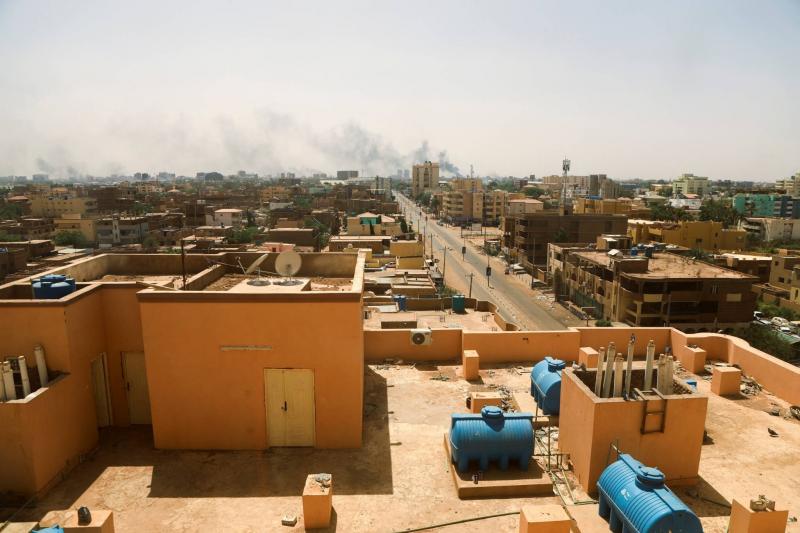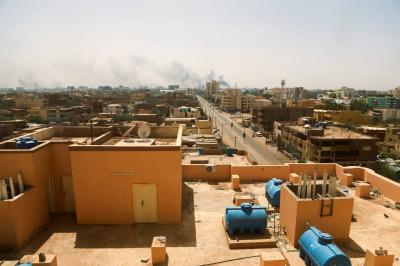Air and artillery bombardment continued in Sudan's capital Khartoum on Friday after the army and the Rapid Support Forces, a paramilitary group, failed to agree on a ceasefire, despite their commitment to protect civilians and allow humanitarian aid to pass. Musa Khaddam, advisor to the leader of the Rapid Support Forces, told Sky News Arabia that the group would adhere to the agreed principles aimed at reaching a complete ceasefire. However, violence has not subsided, and the army has not commented on the agreement.
The Sudanese army and the Rapid Support Forces agreed to uphold Sudan's sovereignty and unity and to refrain from any attacks that could cause civilian harm. This announcement came after days of arduous negotiations between the two sides in the Saudi city of Jeddah, and over a month after confrontations began between the army led by General Abdel Fattah al-Burhan and the Rapid Support Forces led by General Mohamed Hamdan Dagalo (Hemedti).
According to the "Jeddah Declaration," the interests of the Sudanese people are a priority for both parties, committing the army and the Rapid Support Forces to take the necessary precautions to spare civilians any harm, allowing them to leave besieged areas and those experiencing military conflict. Both sides secure protection for medical personnel and public facilities, in addition to adhering to regular humanitarian pauses and days of calm, and refraining from recruiting and using children in hostilities.
U.S. State Department spokesperson Matthew Miller expressed happiness over the announcement that "representatives of the Sudanese armed forces and the Rapid Support Forces signed a commitment declaration recognizing the necessity of facilitating humanitarian work to meet the urgent needs of civilians in Sudan."
On the resumption of ceasefire talks in Sudan, the UN special representative for Sudan, Volker Perthes, indicated on Friday that discussions would resume within a day or two, noting a change in the positions of both warring parties, making them potentially more willing to commit to any future agreements. In a press conference in Geneva, Perthes stated he spoke with one side after an agreement was reached and received assurances of their willingness to continue negotiations. He added, "We expect to resume those ceasefire discussions today or tomorrow; theoretically, the agreement on ceasefire terms should not take long."
In Darfur, western Sudan, violence renewed after one group attacked another armed group in the city of Geneina, with machine gun and artillery fire rocking the neighborhoods following a relative calm that lasted two weeks. Clashes among local armed groups led to the deaths of 450 last month in the region.
The agreement reached on Thursday, resulting from Saudi and American mediation efforts in Jeddah, included commitments to allow safe passage for civilians, paramedics, and humanitarian relief while reducing harm to civilians and public facilities. U.S. officials stated that the signing would be followed by negotiations on a ceasefire and that Saudi Arabia described the agreement as a "first step." A mediator noted that intermediaries pushed both sides to sign a declaration of principles for the protection of civilians to alleviate tensions amid ongoing disagreements over achieving a broader ceasefire. However, a senior U.S. State Department official indicated that "the two parties are very far apart," and they do not expect full compliance with the principles stated in the declaration.
The two sides agreed to evacuate homes and other private properties, but a family in Bahri reported that Rapid Support Forces fighters attempted to seize their home on Friday morning. The United Nations, the African Union, and the Intergovernmental Authority on Development (IGAD) stated, "Both sides must communicate clear and unambiguous instructions to lower ranks" to implement the agreement.
Many UN agencies and other relief organizations have halted aid to Sudan, particularly in the capital Khartoum, awaiting guarantees for the safety of supplies and workers. The World Health Organization reported that at least 600 people have been killed and over five thousand injured in the fighting, but indicated that the actual numbers are likely much higher.




